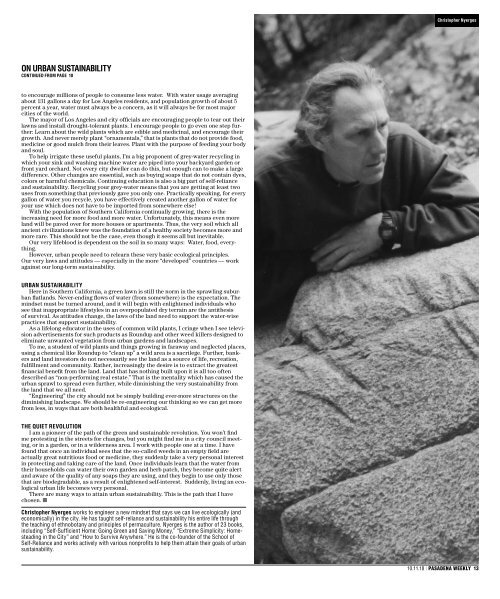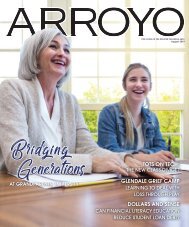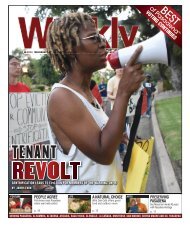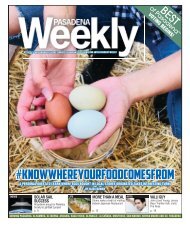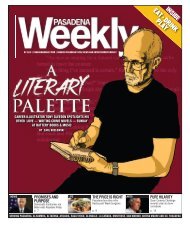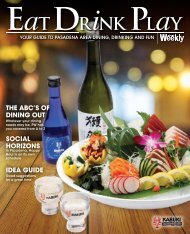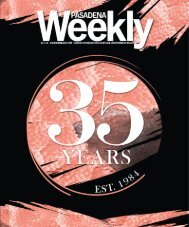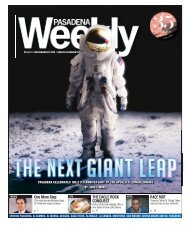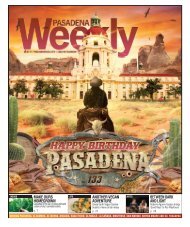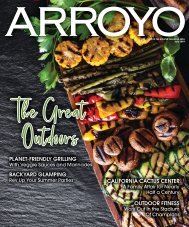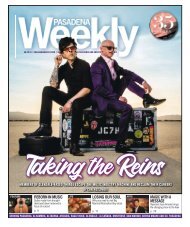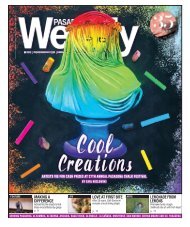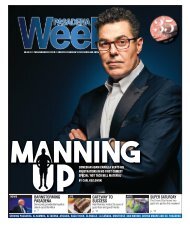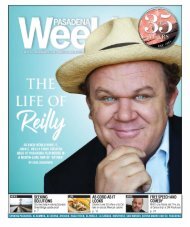10.11.18
You also want an ePaper? Increase the reach of your titles
YUMPU automatically turns print PDFs into web optimized ePapers that Google loves.
Christopher Nyerges<br />
ON URBAN SUSTAINABILITY<br />
CONTINUED FROM PAGE 10<br />
to encourage millions of people to consume less water. With water usage averaging<br />
about 131 gallons a day for Los Angeles residents, and population growth of about 5<br />
percent a year, water must always be a concern, as it will always be for most major<br />
cities of the world.<br />
The mayor of Los Angeles and city officials are encouraging people to tear out their<br />
lawns and install drought-tolerant plants. I encourage people to go even one step further:<br />
Learn about the wild plants which are edible and medicinal, and encourage their<br />
growth. And never merely plant “ornamentals,” that is plants that do not provide food,<br />
medicine or good mulch from their leaves. Plant with the purpose of feeding your body<br />
and soul.<br />
To help irrigate these useful plants, I’m a big proponent of grey-water recycling in<br />
which your sink and washing machine water are piped into your backyard garden or<br />
front yard orchard. Not every city dweller can do this, but enough can to make a large<br />
difference. Other changes are essential, such as buying soaps that do not contain dyes,<br />
colors or harmful chemicals. Continuing education is also a big part of self-reliance<br />
and sustainability. Recycling your grey-water means that you are getting at least two<br />
uses from something that previously gave you only one. Practically speaking, for every<br />
gallon of water you recycle, you have effectively created another gallon of water for<br />
your use which does not have to be imported from somewhere else!<br />
With the population of Southern California continually growing, there is the<br />
increasing need for more food and more water. Unfortunately, this means even more<br />
land will be paved over for more houses or apartments. Thus, the very soil which all<br />
ancient civilizations knew was the foundation of a healthy society becomes more and<br />
more rare. This should not be the case, even though it seems all but inevitable.<br />
Our very lifeblood is dependent on the soil in so many ways: Water, food, everything.<br />
However, urban people need to relearn these very basic ecological principles.<br />
Our very laws and attitudes — especially in the more “developed” countries — work<br />
against our long-term sustainability.<br />
URBAN SUSTAINABILITY<br />
Here in Southern California, a green lawn is still the norm in the sprawling suburban<br />
flatlands. Never-ending flows of water (from somewhere) is the expectation. The<br />
mindset must be turned around, and it will begin with enlightened individuals who<br />
see that inappropriate lifestyles in an overpopulated dry terrain are the antithesis<br />
of survival. As attitudes change, the laws of the land need to support the water-wise<br />
practices that support sustainability.<br />
As a lifelong educator in the uses of common wild plants, I cringe when I see television<br />
advertisements for such products as Roundup and other weed killers designed to<br />
eliminate unwanted vegetation from urban gardens and landscapes.<br />
To me, a student of wild plants and things growing in faraway and neglected places,<br />
using a chemical like Roundup to “clean up” a wild area is a sacrilege. Further, bankers<br />
and land investors do not necessarily see the land as a source of life, recreation,<br />
fulfillment and community. Rather, increasingly the desire is to extract the greatest<br />
financial benefit from the land. Land that has nothing built upon it is all too often<br />
described as “non-performing real estate.” That is the mentality which has caused the<br />
urban sprawl to spread even further, while diminishing the very sustainability from<br />
the land that we all need.<br />
“Engineering” the city should not be simply building ever-more structures on the<br />
diminishing landscape. We should be re-engineering our thinking so we can get more<br />
from less, in ways that are both healthful and ecological.<br />
THE QUIET REVOLUTION<br />
I am a pioneer of the path of the green and sustainable revolution. You won’t find<br />
me protesting in the streets for changes, but you might find me in a city council meeting,<br />
or in a garden, or in a wilderness area. I work with people one at a time. I have<br />
found that once an individual sees that the so-called weeds in an empty field are<br />
actually great nutritious food or medicine, they suddenly take a very personal interest<br />
in protecting and taking care of the land. Once individuals learn that the water from<br />
their households can water their own garden and herb patch, they become quite alert<br />
and aware of the quality of any soaps they are using, and they begin to use only those<br />
that are biodegradable, as a result of enlightened self-interest. Suddenly, living an ecological<br />
urban life becomes very personal.<br />
There are many ways to attain urban sustainability. This is the path that I have<br />
chosen. ■<br />
Christopher Nyerges works to engineer a new mindset that says we can live ecologically (and<br />
economically) in the city. He has taught self-reliance and sustainability his entire life through<br />
the teaching of ethnobotany and principles of permaculture. Nyerges is the author of 23 books,<br />
including “Self-Suffi cient Home: Going Green and Saving Money,” “Extreme Simplicity: Homesteading<br />
in the City” and “How to Survive Anywhere.” He is the co-founder of the School of<br />
Self-Reliance and works actively with various nonprofi ts to help them attain their goals of urban<br />
sustainability.<br />
<strong>10.11.18</strong> | PASADENA WEEKLY 13


